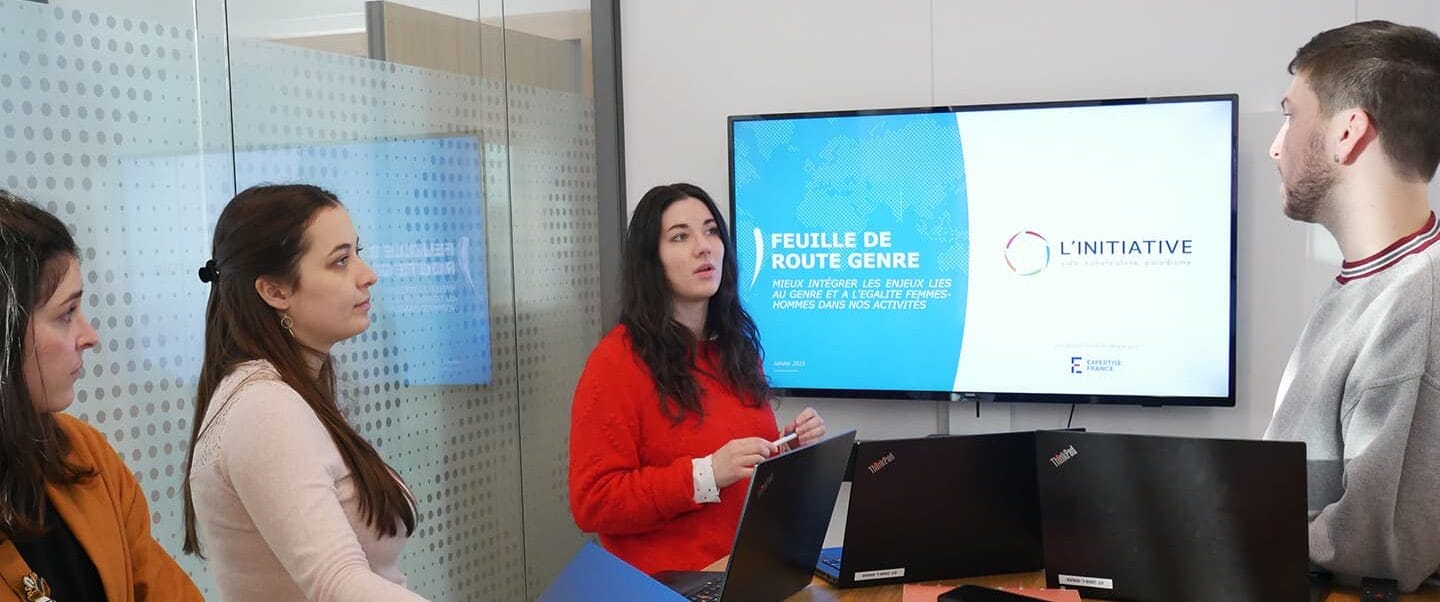In keeping with its overall strategy, L’Initiative mainstreams gender in its activities. L’Initiative’s gender working group is one of its most active cross-cutting think tanks. Adeline Battier, L’Accélérateur’s project manager, has been coordinating the group since 2022.
Why is gender mainstreaming necessary for L’Initiative to fulfill its primary mission to improve access to health for all and eliminate the HIV/AIDS, tuberculosis, and malaria pandemics?
Women face social and financial barriers that limit their access to health services. Similarly, men may encounter other constraints that prevent them from seeking adequate care, such as professional commitments. Men and women have different health-related challenges and use healthcare services in different ways. Gender-based inequalities really are a major determinant of health. We must take this into account when implementing projects to prevent disease and improve access to health services. This applies to all illnesses and all possible reasons for seeking care.
In practical terms, how do you mainstream gender in development projects?
As a development actor, we’re accountable for our activities and have targets to meet. Our current target is for 50% of the projects we fund or implement to take gender into account in their project goals. We plan to gradually increase this proportion to 75% in the years to come. To achieve this, we really need to support project initiators. Some of them ask for assistance, which allows us to offer dedicated expertise. Others don’t consider gender a priority, requiring a more prescriptive stance. But the idea is to maintain dialogue. Sometimes, after hours of discussions, we agree on an additional activity, such as “awareness sessions for health professionals.” This is a start. We’ve sown a seed, then we wait and see if it will take root.
Has L’Initiative funded and supported a flagship project that takes gender into account?
L’Accélérateur recently invested €5 million in projects that provide cervical cancer care in five countries. Here, the gender connection seems quite obvious, since cervical cancer only affects women. But in practice, things are much more complex. Simply launching services for women isn’t enough. We also need to consider the specific constraints and barriers that hinder their access to these services. One aim of these projects is to assess the barriers to cervical cancer screening using smear tests. Women are sometimes uncomfortable visiting their doctor for this rather invasive test. In this case, we can offer them self-testing and provide instructions on how to carry out the test. This innovative, interesting project enables women to access a free service and addresses one possible barrier to access.
How are gender issues addressed on the international scene?
L’Initiative actually took part in developing this strategy.
One of our missions is to help extend France’s sphere of influence, as well as that of French-speaking organizations. Using our own influence and the French diplomatic network, we can raise certain topics and carry out advocacy with governments, even in countries that may be more resistant to these issues. All French organizations working in the field of sexual and reproductive health and rights took part in the consultation process. We therefore quite naturally contributed to developing and reviewing this strategy.
How does L’Initiative mainstream gender in its activities and, more specifically, what is L’Accélérateur’s role in supporting this?
L’Accélérateur is different because our investments are a bit more substantial than the Projects Channel, which funds projects using standard calls for projects. L’Accélérateur also focuses on co-developing projects with their initiators, thus steering projects towards issues that haven’t received a sufficient share of our investments over the last ten years. This is our new ambition: to enhance our structural impact and drive long-term transformations in health systems. This new support role means we can help initiators develop their projects and include issues that they hadn’t envisaged initially.
For example, L’Initiative provides funding and technical assistance for projects that strengthen human resources for health, support community systems, improve sexual and reproductive health and rights, and strive to respond to other neglected
L’Initiative’s strategy includes a Gender roadmap. How does this promote gender mainstreaming?
In conjunction with L’Initiative’s Strategy for 2023-2025, this roadmap provides a practical approach to gender mainstreaming for all our support mechanisms, because our work applies to all L’Initiative’s activities.
For the Expertise Channel, the first steps in adopting a gender-sensitive approach are to increase the proportion of women in our pool of experts and to strive to set an example in our technical assistance content. The goal is to improve the way we address gender issues in our technical assistance missions, both in the recommendations we make and in the various requests that we receive. To achieve this goal, we have produced fact sheets to help our experts incorporate gender issues into their missions.
The Projects Channel offers solutions that are adapted to the local context. This means taking into consideration the main barriers people face in accessing health services and increasing our team’s awareness of these issues. Although gender issues are prominent in our calls for projects, some projects don’t mention them at all. This approach also applies to L’Accélérateur. We’re therefore working to update documents and calls for projects, as well as introduce benchmarking tools (like the DAC gender equality policy marker) and provide ongoing training for our teams.
Aside from mainstreaming gender in your support mechanisms, how do you incorporate gender into your goals and missions to share knowledge, in particular with the French-speaking world?
To produce and share knowledge, L’Initiative carries out internal training and updates its library so the whole team has access to the necessary gender mainstreaming resources. As I mentioned earlier, we also provide support for French and French-speaking organizations by helping to develop expertise on health and gender, so that we can improve how we address these issues in our activities.

